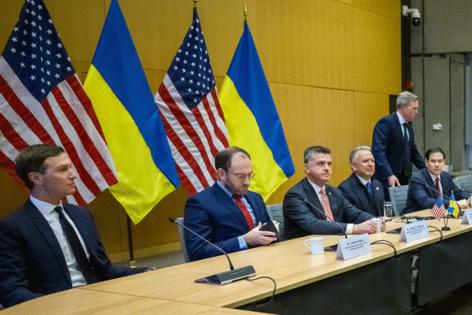Russia says US envoy Witkoff to visit Moscow for peace talks
Published in News & Features
U.S. presidential envoy Steve Witkoff will lead a delegation for talks in Russia next week, a Kremlin official said, as Donald Trump pushes for a deal to end the war in Ukraine.
“As for Witkoff, I can say there is a preliminary agreement that he will visit Moscow next week,” Yuri Ushakov, an aide to Putin, said in a video clip of an interview posted on Telegram Wednesday. “He and some other representatives of the administration involved in Ukrainian affairs.”
“If Witkoff arrives, he’ll likely be received by the Russian president,” Ushakov later said, according to the state-run Tass news agency. Kremlin spokesman Dmitry Peskov said the exact date for the visit had yet to be set, the Interfax news service reported.
The trip is part of Trump’s latest effort to deliver peace after almost four years of Russia’s full-scale invasion, which the president once promised to end within 24 hours of taking office. While the U.S. has touted progress in talks with Ukraine, the negotiations still face the same obstacles as previous rounds: What satisfies Ukraine is likely a deal-breaker for Russia, and vice versa.
Trump earlier said that he had dispatched Witkoff to Moscow for a probable meeting with Putin next week, and that the envoy might be joined by the president’s son-in-law, Jared Kushner. Army Secretary Dan Driscoll — who has been meeting with the Russians in Abu Dhabi — was directed to talk with the Ukrainians, he said.
Trump also told reporters he had no deadline for an agreement, but said on social media he wouldn’t meet with the leaders of the two countries until a deal was at least in its final stages.
Just last week, Ukraine was facing an ultimatum to agree to the terms of a deal that appeared to favor Russia by Thanksgiving. The document was watered down into a new plan following the flurry of diplomatic activity over the weekend and under pressure from Kyiv’s western allies.
Yet despite White House’s optimism around the negotiations, doubts remain in European capitals.
Most of Ukraine’s western allies agreed during a call that included leaders from the so-called Coalition of the Willing late on Tuesday that Putin has no interest in an immediate ceasefire, according to people familiar with the matter. The call was attended by Ukrainian President Volodymyr Zelenskyy and U.S. State Secretary Marco Rubio.
The Kremlin on Wednesday also pushed back on the idea that a deal was imminent. “You need to wait, it is too early to talk about that,” Peskov said when asked about whether an agreement was close, according to Interfax.
Trump on Tuesday said there was “tremendous progress” made over the past week. “The original 28-Point Peace Plan, which was drafted by the United States, has been fine-tuned, with additional input from both sides, and there are only a few remaining points of disagreement,” he said on Tuesday, referring to a proposal that drew the ire of Ukrainians and Europeans.
That initial draft plan caught Kyiv and Ukrainian allies off-guard with its demands that the war-battered nation drop its ambition to join NATO and surrender territory in the Donetsk region, including areas Russia doesn’t yet control. Trump, acknowledging the blowback, said the original proposal had been intended as a “concept” or “map” to steer negotiations.
Ushakov said he speaks often with Witkoff, but declined to comment on a Bloomberg News report that the U.S. envoy advised the Kremlin aide in an Oct. 14 phone call on how Putin should broach the issue of a peace plan with Trump. His guidance included suggestions on setting up a Trump-Putin call before Zelenskyy’s White House visit later that week and using a recent Gaza agreement as a way in.
“The substance of our conversations is confidential, and I don’t comment on them,” Ushakov said. When asked from where the information was coming, he said, “Are they listening in? I don’t know, someone is leaking, someone is listening, but not us.”
Ushakov told the Kommersant newspaper that the contacts occur over secure communications, but “there are some WhatsApp conversations that, in general, someone could somehow listen.” He added “it’s unlikely that the participants in the conversation could leak anything like that,” as it wasn’t in their interest.
Ushakov said relations with the U.S. were “currently being built, and it’s being built with difficulty, built through these kinds of contacts, including by phone.”
Driscoll was in discussions with Russian officials late Monday and throughout Tuesday in Abu Dhabi “to achieve a lasting peace in Ukraine,” Lieutenant Colonel Jeff Tolbert, a spokesman for the U.S. army secretary, said in a statement on Tuesday. He said the talks were “going well and we remain optimistic.”
While Ushakov confirmed that Driscoll met with representatives of Russian intelligence agencies in the capital of the United Arab Emirates, he said Trump’s peace proposal wasn’t discussed during the meetings. Russian officials have seen the plan, but it “hasn’t even been discussed in detail yet,” he said.
Witkoff is not the only official expected in Moscow in the coming days. Hungarian Prime Minister Viktor Orban plans to meet Putin on Friday, according to news website Telex. Orban, who has built good relations with both Putin and Trump, previously traveled to Moscow on a self-styled “peace mission” in July 2024. His trip triggering condemnation from European Union leaders who said he had no mandate to represent the bloc.
---------
—With assistance from Alberto Nardelli.
©2025 Bloomberg L.P. Visit bloomberg.com. Distributed by Tribune Content Agency, LLC.







Comments